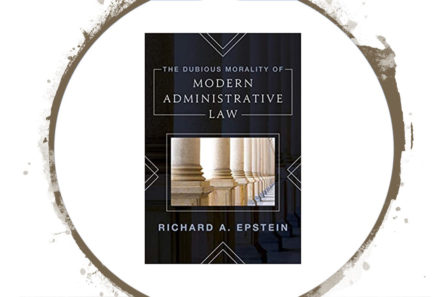[Live Podcast] Book Review: The Dubious Morality of Modern Administrative Law

July 6, 2020 at 3:00 PM ET
Richard Epstein’s The Dubious Morality of Modern Administrative Law examines how the growth of the administrative state as a result of FDR’s New Deal has coincided with many different Supreme Court decisions since the 1936-37 term of the Court that legitimized the reach of different administrative agencies by giving them far more control over substantive issues through different forms of judicial deference to agency interpretation, such as Auer and Chevron deference. Throughout his book, Epstein effectively frames how Auer deference, Chevron deference, and the Court’s major decision, Motor Vehicle Manufacturers Association v. State Farm, led to the courts becoming “too deferential on questions of law and too interventionist on matters of fact.” Epstein asserts that the administrative state has grown far too powerful for us to mitigate its power significantly. However, he suggests that we can initiate a minor constitutional revolution in administrative law by turning away from the judicial language that has delegated power and abandoned procedural protection by returning “the law to its original design, meaning, and structure.” One way this can be achieved, according to Epstein, is by simply following the original text of the Administrative Procedures Act and avoiding the judicial language that has complicated its meaning since its implementation in 1946.

Speaker
Laurence A. Tisch Professor of Law and Director, Classical Liberal Institute
New York University School of Law
Moderator
Assistant Professor and Executive Director, The C. Boyden Gray Center for the Study of the Administrative State
Antonin Scalia Law School
Sponsor
Federalist Society’s Practice Groups
The Federalist Society and Regulatory Transparency Project take no position on particular legal or public policy matters. All expressions of opinion are those of the speaker(s). To join the debate, please email us at [email protected].


